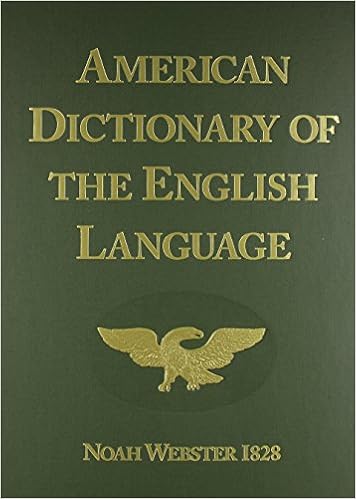So here is a strange one for you. I got this dictionary the other day to add to my more modern New Oxford American dictionary. Sylvia? I can hear you asking, don't you just need one dictionary?
Not exactly. While my Oxford is a modern work, this is a reprint of the original 1828 version of this reference guide. So, why would I need that? The meanings of words change, so shouldn't you have the latest reference guide?
Not exactly. From my series on Madame Bovary, I discovered the absolute joy of books written before the modern era. Diving back into an earlier age lets me experience some real treasures and joys from those who put pen to paper, struggled with the early days of book binding and put-the-metal-letters on the page-press printing, and things written when the art was a craft. The older works re-energize me, hold secrets deep and meaningful, and I find just make me a better writer the more time I spend with them.
Because the meanings of words change, I need a book from that time to get the full meaning of what the words were trying to say - back then. A modern work would not give me all the wonderful context and flavor for writers of this time. Here I can dive back into the words, enjoy them as they were, and even use them in a proper historical context should I choose to write for that era.
Now this is also a historical document, one of the important books for a country's founding and one that traveled the world), so you are going to get a lot of bible quotes and other material that dictionary publishers these days would not add to such a reference guide in fear of upsetting someone on social media. I pride myself on my scholarly and independent nature, so I can distance myself from the work and still recognize its impact and importance. But if you are sensitive or disagree with those things, be forewarned, but please be understanding of the time and the noted author's beliefs.
Also note, many dictionaries these days are not including the word fuck. I cannot wait until this silly age passes and we can get our words back. This work does not have the word, being a work done by a more religious scholar. I guess we have came full circle. My Oxford 2010? That book has a fuck to give me ...the meaning of. It is a silly thing to think about, but it is a test of is a reference guide impartial, or is it trying to push an agenda and protect us from nasty words.
Recommended highly if you are into pre-1900s literature or are a general history buff. This is also a fun read because it describes a world before the era of technology, so if you are into writing fantasy you will have a huge window into a simpler time with simpler meanings, and also words taken from books of faith and other classical sources. That may be of value to you if you are trying to develop a culture and language, and trying to recreate how a people builds and collects the words which bring meaning to a world.

Comments
Post a Comment